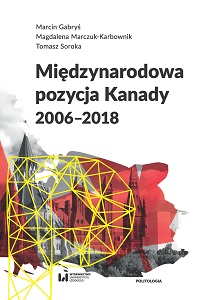Międzynarodowa pozycja Kanady (2006–2018)
International Position of Canada (2006-2018)
Author(s): Marcin Gabryś, Magdalena Marczuk-Karbownik, Tomasz Soroka
Subject(s): Politics / Political Sciences, Politics, Public Administration, Government/Political systems, Security and defense, Military policy, Peace and Conflict Studies
Published by: Wydawnictwo Uniwersytetu Łódzkiego
Keywords: Canadian Foreign Policy; Stephen Harper; Justin Trudeau; NATO
Summary/Abstract: The book Międzynarodowa pozycja Kanady (2006-2018)] [International position of Canada (2006-2018)] consists of three chapters written by three different scholars. Each chapter identifies and analyzes specific factors that have determined the position Canada holds in the contemporary international relations. The first chapter is devoted to the assessment of Canada's foreign policy during Stephen Harper’s prime ministership (2006-2015). This part of the book distinguishes and analyzes four basic elements of Stephen Harper's foreign policy doctrine: the need to keep a broad conservative coalition and to include the values and interests of this group of voters (as well as the personal views of the prime minister) in the formulation of foreign policy; the emphasis on the need to increase the role of the military sphere in building the international position of Canada; the redefinition of Ottawa's attitude to multilateralism; the importance of the economic sphere of international relations, especially international trade and the export of Canada’s natural resources, particularly energy resources. The second chapter is focused on the most contemporary Canadian foreign policy, as it was conducted by the Justin Trudeau government in the years 2015-2018. The chapter presents both the main theoretical assumptions of the Trudeau foreign policy doctrine and its practical implementation in such spheres of external policy as Canada's activity in the fora of multilateral international organizations, particularly in the contexts of peace-building and peacekeeping, immigration and refugee policies and bilateral economic relations between Canada and the U.S. The third chapter analyzes Canadian foreign policy towards Central and Eastern Europe between 2014 and 2018. The chapter proves that firm attitude towards Russia (especially sharp rhetoric and imposition of economic sanctions), military engagement within NATO and its reassurance measures in promoting security in Central and Eastern Europe, political, financial and military support for Ukraine, and closer cooperation with Poland can be considered as good exemplifications of Harper`s doctrine in Canadian foreign policy. The large Polish and Ukrainian diasporas in Canada, and their influence on politics in Ottawa is a very important factor as well. The Liberal government of Justin Trudeau has different foreign policy goals – it regards the necessity of a political dialog with Russia in other fields. However, Trudeau declares willingness to prolong supporting measures for Ukraine and commitment to NATO.
Series: Uniwersytet Łódzki
- E-ISBN-13: 978-83-8142-444-8
- Print-ISBN-13: 978-83-8142-443-1
- Page Count: 196
- Publication Year: 2018
- Language: Polish
- Table of Content
- Introduction
- eBook-PDF

